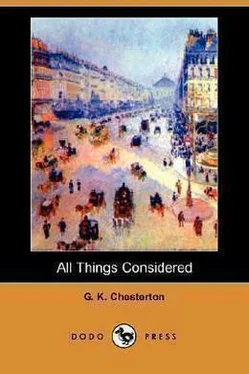Let a man walk ten miles steadily on a hot summer's day along a dusty English road, and he will soon discover why beer was invented. The fact that beer has a very slight stimulating quality will be quite among the smallest reasons that induce him to ask for it. In short, he will not be in the least desiring alcohol; he will be desiring beer. But, of course, the question cannot be settled in such a simple way. The real difficulty which confronts everybody, and which especially confronts doctors, is that the extraordinary position of man in the physical universe makes it practically impossible to treat him in either one direction or the other in a purely physical way. Man is an exception, whatever else he is. If he is not the image of God, then he is a disease of the dust. If it is not true that a divine being fell, then we can only say that one of the animals went entirely off its head. In neither case can we really argue very much from the body of man simply considered as the body of an innocent and healthy animal. His body has got too much mixed up with his soul, as we see in the supreme instance of sex. It may be worth while uttering the warning to wealthy philanthropists and idealists that this argument from the animal should not be thoughtlessly used, even against the atrocious evils of excess; it is an argument that proves too little or too much.
Doubtless, it is unnatural to be drunk. But then in a real sense it is unnatural to be human. Doubtless, the intemperate workman wastes his tissues in drinking; but no one knows how much the sober workman wastes his tissues by working. No one knows how much the wealthy philanthropist wastes his tissues by talking; or, in much rarer conditions, by thinking. All the human things are more dangerous than anything that affects the beasts—sex, poetry, property, religion. The real case against drunkenness is not that it calls up the beast, but that it calls up the Devil. It does not call up the beast, and if it did it would not matter much, as a rule; the beast is a harmless and rather amiable creature, as anybody can see by watching cattle. There is nothing bestial about intoxication; and certainly there is nothing intoxicating or even particularly lively about beasts. Man is always something worse or something better than an animal; and a mere argument from animal perfection never touches him at all. Thus, in sex no animal is either chivalrous or obscene. And thus no animal ever invented anything so bad as drunkenness—or so good as drink.
The pronouncement of these particular doctors is very clear and uncompromising; in the modern atmosphere, indeed, it even deserves some credit for moral courage. The majority of modern people, of course, will probably agree with it in so far as it declares that alcoholic drinks are often of supreme value in emergencies of illness; but many people, I fear, will open their eyes at the emphatic terms in which they describe such drink as considered as a beverage; but they are not content with declaring that the drink is in moderation harmless: they distinctly declare that it is in moderation beneficial. But I fancy that, in saying this, the doctors had in mind a truth that runs somewhat counter to the common opinion. I fancy that it is the experience of most doctors that giving any alcohol for illness (though often necessary) is about the most morally dangerous way of giving it. Instead of giving it to a healthy person who has many other forms of life, you are giving it to a desperate person, to whom it is the only form of life. The invalid can hardly be blamed if by some accident of his erratic and overwrought condition he comes to remember the thing as the very water of vitality and to use it as such. For in so far as drinking is really a sin it is not because drinking is wild, but because drinking is tame; not in so far as it is anarchy, but in so far as it is slavery. Probably the worst way to drink is to drink medicinally. Certainly the safest way to drink is to drink carelessly; that is, without caring much for anything, and especially not caring for the drink.
The doctor, of course, ought to be able to do a great deal in the way of restraining those individual cases where there is plainly an evil thirst; and beyond that the only hope would seem to be in some increase, or, rather, some concentration of ordinary public opinion on the subject. I have always held consistently my own modest theory on the subject. I believe that if by some method the local public–house could be as definite and isolated a place as the local post–office or the local railway station, if all types of people passed through it for all types of refreshment, you would have the same safeguard against a man behaving in a disgusting way in a tavern that you have at present against his behaving in a disgusting way in a post–office: simply the presence of his ordinary sensible neighbours. In such a place the kind of lunatic who wants to drink an unlimited number of whiskies would be treated with the same severity with which the post office authorities would treat an amiable lunatic who had an appetite for licking an unlimited number of stamps. It is a small matter whether in either case a technical refusal would be officially employed. It is an essential matter that in both cases the authorities could rapidly communicate with the friends and family of the mentally afflicted person. At least, the postmistress would not dangle a strip of tempting sixpenny stamps before the enthusiast's eyes as he was being dragged away with his tongue out. If we made drinking open and official we might be taking one step towards making it careless. In such things to be careless is to be sane: for neither drunkards nor Moslems can be careless about drink.
Demagogues and Mystagogues
I once heard a man call this age the age of demagogues. Of this I can only say, in the admirably sensible words of the angry coachman in "Pickwick," that "that remark's political, or what is much the same, it ain't true." So far from being the age of demagogues, this is really and specially the age of mystagogues. So far from this being a time in which things are praised because they are popular, the truth is that this is the first time, perhaps, in the whole history of the world in which things can be praised because they are unpopular. The demagogue succeeds because he makes himself understood, even if he is not worth understanding. But the mystagogue succeeds because he gets himself misunderstood; although, as a rule, he is not even worth misunderstanding. Gladstone was a demagogue: Disraeli a mystagogue. But ours is specially the time when a man can advertise his wares not as a universality, but as what the tradesmen call "a speciality." We all know this, for instance, about modern art. Michelangelo and Whistler were both fine artists; but one is obviously public, the other obviously private, or, rather, not obvious at all. Michelangelo's frescoes are doubtless finer than the popular judgment, but they are plainly meant to strike the popular judgment. Whistler's pictures seem often meant to escape the popular judgment; they even seem meant to escape the popular admiration. They are elusive, fugitive; they fly even from praise. Doubtless many artists in Michelangelo's day declared themselves to be great artists, although they were unsuccessful. But they did not declare themselves great artists because they were unsuccessful: that is the peculiarity of our own time, which has a positive bias against the populace.
Another case of the same kind of thing can be found in the latest conceptions of humour. By the wholesome tradition of mankind, a joke was a thing meant to amuse men; a joke which did not amuse them was a failure, just as a fire which did not warm them was a failure. But we have seen the process of secrecy and aristocracy introduced even into jokes. If a joke falls flat, a small school of æsthetes only ask us to notice the wild grace of its falling and its perfect flatness after its fall. The old idea that the joke was not good enough for the company has been superseded by the new aristocratic idea that the company was not worthy of the joke. They have introduced an almost insane individualism into that one form of intercourse which is specially and uproariously communal. They have made even levities into secrets. They have made laughter lonelier than tears.
Читать дальше








